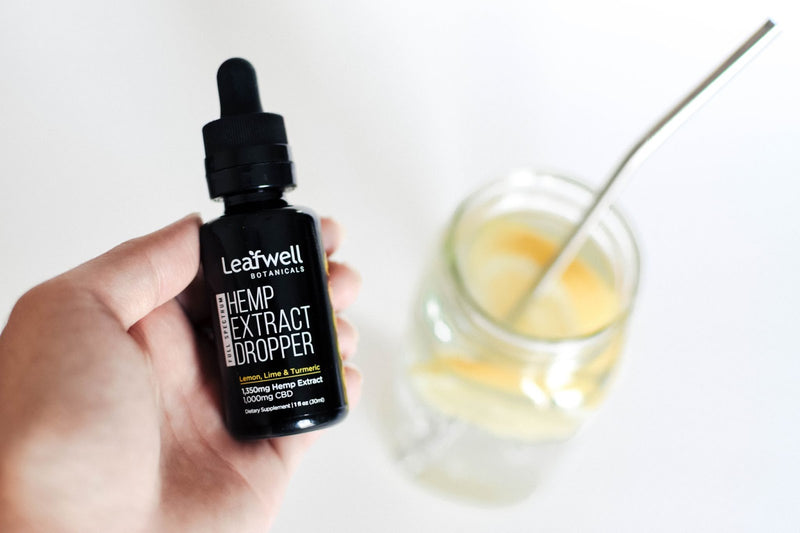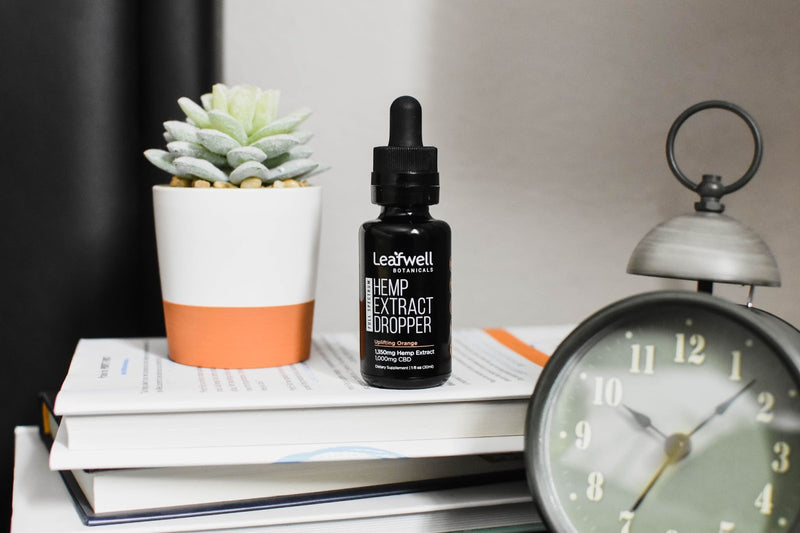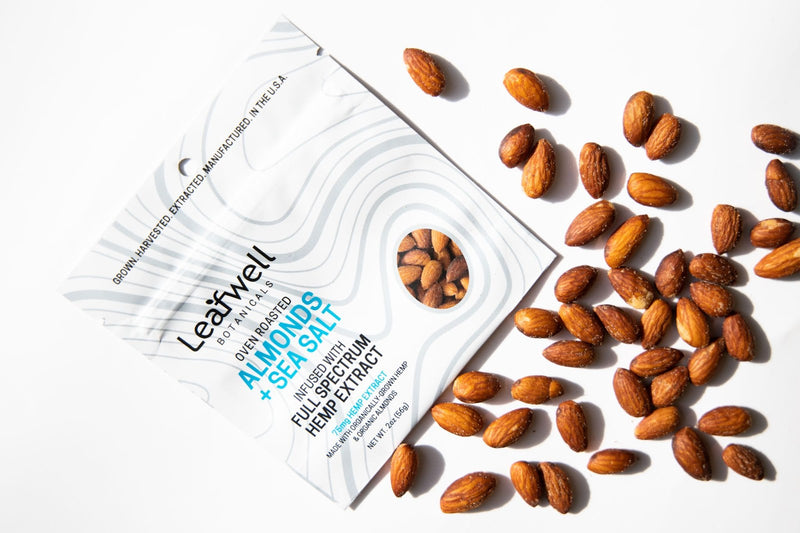CBD Overdose: Can You Take Too Much CBD?

CBD, or cannabidiol, is an ingredient derived from the cannabis plant. People use CBD oil for many reasons, including to help alleviate discomfort, support a good night’s rest, and enjoy mental wellness. You can find CBD in food (supplements) products, tinctures (drops), capsules, and in all types of topicals.
Just like with any supplement, there is a recommended dose of CBD that may vary depending on various personal and health-related factors. Given this, many people wonder if there’s a risk of taking too much CBD, but how much is too much?
This article will discuss how much CBD is safe to take, as well as how much CBD you would have to consume to reach toxic levels.
But first, we will make sure you know the difference between CBD and THC, so you understand that they are two different substances with two very different sets of effects.
What is the Difference Between CBD and THC?
CBD and THC are currently the two main cannabinoids everyone’s talking about, meaning they are both predominantly found and derived from the cannabis plant.
The main difference between the two is that THC has intoxicating effects on the body while CBD does not (it actually has a counteracting impact). In other words, THC is the substance within cannabis that causes a high.
You can find both CBD and THC in cannabis, but the amounts of each in the extracts / products will ultimately depend on the following: 1) the plant’s genetics; 2) the extraction methods and amount of processing done; and 3) the amount (potency) being added to the finished products themselves. We’re working on some content that’ll dive deeper into this if you’re curious to learn more!
THC requires users to be more careful dose-wise than CBD because of its intoxicating properties, and potential adverse side effects include: panic, fast heartbeat, fatigue, respiratory distress, anxiety, delirium, muscle spasms, poor cognitive function, and ataxia (reduced coordination/balance).
Though there is no recognized level at which THC consumption becomes toxic, you do not need to consume a toxic amount of THC to experience the above side effects and each user’s experience is different with some not experiencing any side effects while others are more sensitive. Because of this, you need to be especially careful about the dose of THC you take, especially if you’re new to cannabis. All that said, this is not to say anything negative about THC, just that one needs to be more mindful of dose when it comes to THC.
While CBD does not have the intoxicating impact THC has, there are still a few things you need to consider when consuming it.
Can You Take Too Much CBD?
It is natural to worry about whether you can take too much of any supplement you are taking, CBD included.
Whenever you put something in your body, you want to know that it is not going to be harmful or cause any adverse effects. This is especially true when it comes to supplements, since you are generally taking them to receive some type of benefit.
The thing is, yes, technically, you can take too much CBD. But the amount of CBD you would have to consume in order to reach toxic levels is far from easy to reach.
Generally, studies have found that as much as 1,500 mg of CBD taken everyday for long periods of time is well-tolerated.
Let’s look at this using a real life example.
Here at Leafwell Botanicals, one of our most popular products is our Creamy CBD Peanut Butter. Each 16 oz jar of this peanut butter contains 750 mg of CBD. This means to reach that general max-tolerated amount, you would have to eat more than 2 jars of our peanut butter everyday to start to see some discomfort. Not only is that extremely unhealthy considering the fat and oil content of two entire jars of peanut butter, it is also just not something you’d ever want to or be able to do.

Additionally, one of the most popular ways to consume CBD is through soft gels. At Leafwell Botanicals, the most potent CBD soft gels available are 40 mg CBD per soft gel (with each container holding 30 soft gels). In order to surpass that max daily amount, you’d have to down over an entire container consistently day after day.
In other words, you cannot mistakenly take too much CBD--you would have to actively try to do so. Plus, it’s worth reiterating that all the other ingredients you’re taking with your CBD (carrier oils, peanut butter, capsules) would likely make you feel sick long before a “toxic” amount of CBD could.
Okay, enough with all the math. But hopefully, these examples show that almost every person that takes CBD will never come anywhere close to consuming a toxic amount of CBD.
Let’s assume, however, just for the sake of getting all of the necessary information out there, that you manage to consume a toxic dose of CBD. What would happen to you? What does toxic even mean in this sense?
Unfortunately, it is kind of difficult to give a satisfying answer to this. See, in order to study what happens to humans when they consume a toxic dose of CBD, we would have to risk endangering the lives of humans within that study. And because it is so hard to consume a toxic amount of CBD in the required period of time, these results are not necessarily pressing.
Toxic does not have to mean deadly, though, and in this case there is very little evidence that a CBD overdose could cause death.
However, it may cause plenty of “toxic” and, at the very least, unpleasant symptoms, such as:
- Disorientation/confusion
- Extreme fatigue
- Drowsiness
- Diarrhea
- Nausea
- Other gastrointestinal issues
- Appetite loss
Just because a CBD overdose will most likely not cause death, does not mean you should mess around with your dose of CBD. All of the symptoms above can be extremely debilitating in their own right, so stick to the dose recommended by your healthcare provider or the producer of your CBD product.
It is also important to note that the method in which you use CBD also plays a role in how much of it you can take. The above information applies when you are taking soft gels, tinctures, food, or other CBD products that are meant to be consumed, since they will enter the bloodstream. However, topical products will not enter the bloodstream and instead focus on particular spots on your body (i.e. the region where you applied the CBD cream.)
As a result, topical CBD products, such as our Hemp Extract Body Creams, can get away with having slightly larger doses of CBD. Our Cooling Menthol body cream, for example, has 2,000 mg of CBD per jar. On this note, however, it’s worth noting that none of this 2,000 mg of CBD cream reaches your bloodstream, so it works on your body in a very different way than ingestible CBD does. You should still use topical CBD products as directed by your doctor, but since they do not reach the bloodstream, there is even less risk of “overdosing” on them.
To end on a positive, it should be helpful to know that unlike plenty of other substances, such as alcohol and opioids, there is little to no risk developing CBD dependency, at least from a biological standpoint.
While regularly consuming alcohol, for example, always carries some threat of abuse or addiction, you can consume CBD without fear that you will become dependent on it. This of course does not mean that you should go overboard with your consumption of CBD, but rather proves that CBD is a relatively safe supplement to use for supporting your overall health.
What is the Right Amount of CBD You Should Take?
The amount of CBD you should take first depends on what method you are using to consume/experience the CBD -- for example, topical “doses” will vary significantly from ingestion in terms of mg of CBD even if tinctures are actually more potent in your body.
Your size, weight, and other health conditions should also factor into your decision. Finally, the reason you are using CBD is especially important, since certain benefits may require higher concentrations of CBD than others.
No matter what your intended dose of CBD is, it is best to start slowly and gently build your way up to the full dose. This will give your body time to adjust to this new supplement, and it will also allow you to test how well your body responds to CBD.
Your primary care provider is the best person to decide which dose is right for you, and they can tell you if any illnesses you may have, or medications you take might interact with CBD and if you’ll need to take any precautions.
The highest quality CBD brands have all their products tested by accredited third-party facilities, make these test results available to the public, and feature only organic, locally-grown ingredients. If you are looking for a CBD brand that can check all of these boxes, look no further than right here at Leafwell Botanicals.
In Conclusion
CBD products can help promote holistic health by supporting a good night’s sleep, balancing emotional wellness, and soothing tension and discomfort. CBD is not to be confused with THC, which is the psychoactive component of cannabis.
Upwards of 1,500 mg of CBD taken daily is generally well-tolerated, so you would need to intentionally consume a significantly higher amount of CBD than this to experience symptoms of toxicity, and even then, it would most likely not be lethal. What’s more likely is that the other ingredients in your CBD product such as the carrier oil or fatty acids will make you feel sick long before CBD does. Even so, to get the best out of your CBD supplement, you should stick to the recommended dose and talk to your doctor about any potential for side effects.
Sources
Safety and side effects of cannabidiol, a Cannabis sativa constituent (PubMed)
Can You Take Too Much CBD? Here’s What Happens If You Do (bustle.com)







